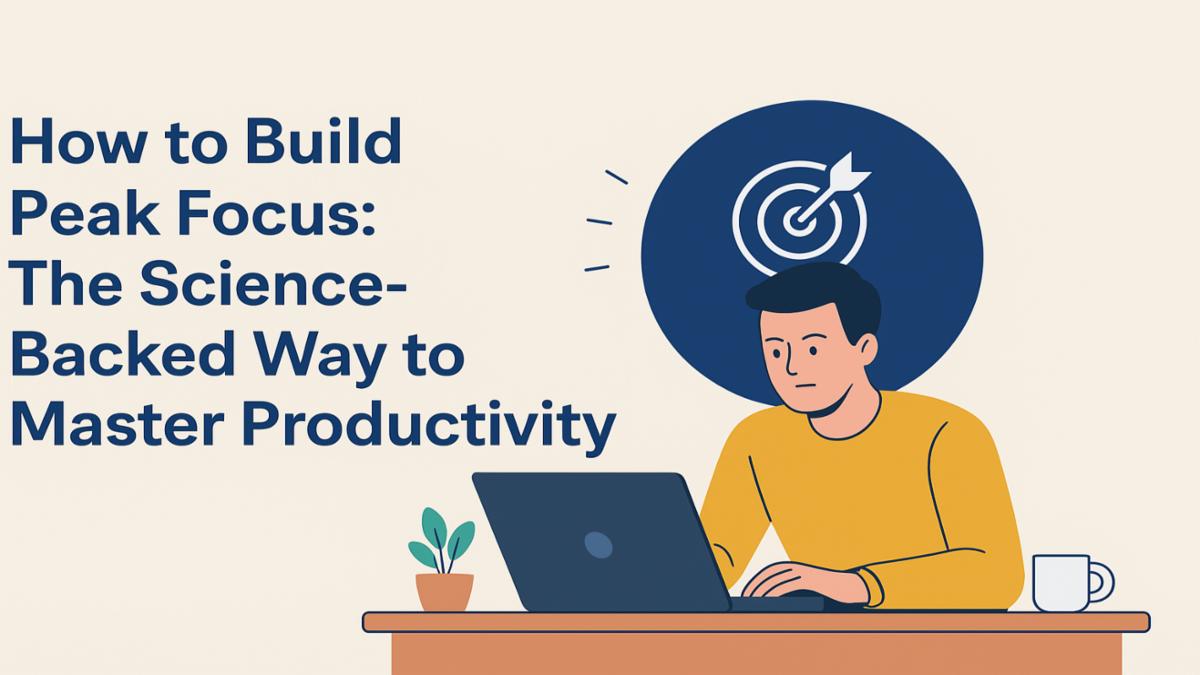Article Body
How to Build Peak Focus: The Science Backed Way to Master Productivity
Introduction
If procrastination is the habit of delay, then focus is the engine of progress. Once you learn to stop putting things off, the next challenge is building the discipline to stay deeply engaged with your work. Experts agree that the ability to focus is not just about working longer hours but about training the mind to perform at its highest potential.
This article explores why focus matters, what science says about concentration, and practical ways to strengthen your ability to work without distraction.
Why Focus Matters More Than Time
Everyone has the same 24 hours in a day, yet the difference in output between people can be massive. Research shows that focus, not time, is the deciding factor.
A recent study from the University of Cambridge in 2025 found that participants who used structured focus techniques completed important tasks 43 percent faster than those who relied only on motivation. Behavioral psychologist Dr Anita Deshmukh explains, "Focus is the new success currency. It determines whether someone is simply busy or genuinely productive."
Practical Steps to Build Peak Focus
-
Create a Distraction Free Zone
Your work environment shapes your attention. A clutter free desk, minimal notifications, and a calm atmosphere act as signals to the brain that it is time to concentrate. -
Follow Simple Rituals
Great achievers often rely on daily rituals. Writers, musicians, and entrepreneurs build small habits that cue the brain into deep work mode, such as starting work at the same time each day or listening to the same playlist. -
Try Focus Sprints
Instead of struggling all day, dedicate 90 minute sprints for high priority tasks. Short recovery breaks between sprints help refresh the brain and keep energy high. -
Work With Your Energy Levels
Everyone has natural peaks of alertness. Schedule demanding work during your most energetic hours and keep routine chores for low energy times.
Technology: A Friend or a Distraction
While smartphones and laptops often fuel procrastination, they can also be allies if used wisely. Apps like Freedom, Forest, and Notion can block distractions, track progress, and gamify focus. However, experts warn against depending fully on apps. Productivity coach Raghav Menon advises, "Use tools to support focus, not replace discipline."
Real Life Stories of Change
-
Riya Sharma, a 27 year old accountant, overcame her habit of binge watching web series by adopting the Pomodoro technique. Within three months, she cleared her exams with distinction.
-
Karan Mehta, a software engineer, improved project delivery speed by 40 percent after shifting from multitasking to single tasking. He also reported feeling calmer and more balanced.
These examples prove that focus is not an inborn talent but a skill that can be learned and improved.
Mistakes to Avoid
-
Believing multitasking improves efficiency. Research shows it reduces performance by up to 30 percent.
-
Waiting for the perfect mood to work. Focus builds from action, not from waiting for inspiration.
-
Relying only on willpower. Discipline works best when supported by an environment that limits distractions.
Conclusion
Breaking free from procrastination is the first step. The next and more powerful step is mastering focus. By creating the right environment, building rituals, and managing energy, anyone can turn temporary productivity into a lasting habit.
In today’s world filled with noise and distraction, the ability to focus is not just a professional advantage. It is the foundation of personal success.


Comments